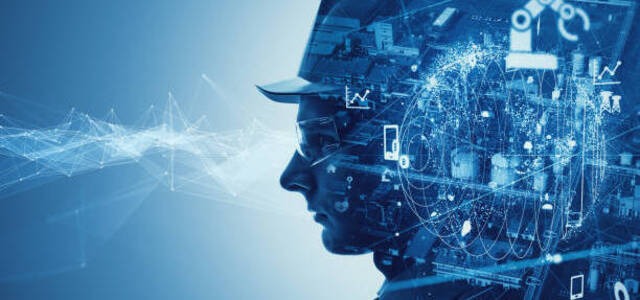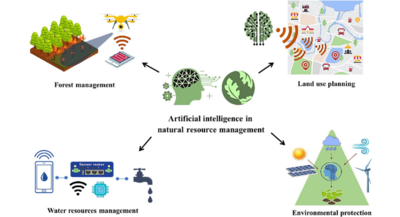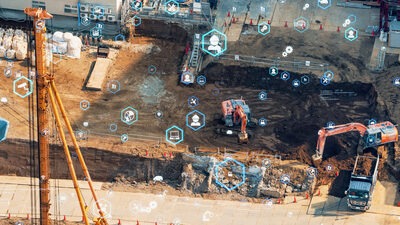
The Role of AI in Revolutionizing Construction Project Management
The construction industry has long been known for its complexities and challenges, ranging from project delays and cost overruns to labor shortages and safety concerns. However, the advent of artificial intelligence (AI) is poised to revolutionize construction project management, bringing unprecedented efficiency and precision to the field. This article delves into how AI can improve scheduling, resource allocation, and project tracking, ultimately transforming the way construction projects are planned and executed.
Introduction to AI in Construction
Artificial intelligence, a branch of computer science that aims to create systems capable of performing tasks that normally require human intelligence, is making significant strides in various industries. In construction, AI is being leveraged to enhance productivity, reduce errors, and streamline processes. The integration of AI technologies is not just a futuristic concept but a present-day reality that is reshaping the industry.
AI technologies, such as machine learning, natural language processing, and computer vision, are being applied to various aspects of construction project management. These technologies can process vast amounts of data, identify patterns, and provide actionable insights that can improve decision-making and efficiency. By embracing AI, construction companies can stay ahead of the competition and deliver projects more effectively.

The Importance of Scheduling in Construction
Traditional Scheduling Challenges
Scheduling is a critical aspect of construction project management. It involves planning the sequence of activities, allocating resources, and setting timelines to ensure that projects are completed on time and within budget. Traditional scheduling methods, such as Gantt charts and critical path analysis, have served the industry for decades. However, these methods often fall short in handling the dynamic and unpredictable nature of construction projects.
AI-Driven Scheduling Solutions
AI offers a transformative approach to scheduling by leveraging machine learning algorithms and data analytics. AI-driven scheduling solutions can analyze vast amounts of data from past projects, identify patterns, and predict potential delays. This proactive approach allows project managers to make informed decisions and adjust schedules in real time, minimizing disruptions and keeping projects on track.
Case Study: AI in Action
For instance, Skanska, a leading construction firm, implemented an AI-based scheduling tool that analyzed historical project data to predict delays caused by weather conditions, material shortages, and labor availability. The tool provided real-time recommendations to adjust schedules, resulting in a 20% reduction in project delays and significant cost savings. Skanska's project managers were able to respond proactively to potential issues, ensuring that projects stayed on track and within budget.
Enhancing Resource Allocation with AI
The Challenge of Resource Allocation
Resource allocation in construction involves the distribution of materials, labor, and equipment to various tasks and projects. Efficient resource allocation is crucial for maximizing productivity and minimizing waste. However, manual resource allocation can be time-consuming and prone to errors, leading to inefficiencies and increased costs.
AI-Powered Resource Management
AI-powered resource management systems use predictive analytics to forecast resource needs accurately. These systems can analyze project data, including timelines, budgets, and resource availability, to optimize resource allocation. AI can also factor in external variables such as supply chain disruptions and labor market trends, ensuring that resources are allocated effectively.

Real-World Example: Optimizing Resource Utilization
Balfour Beatty, a major construction and engineering company, adopted an AI-based resource management platform that integrated with its project management software. The platform used machine learning algorithms to predict material requirements, optimize equipment usage, and schedule labor shifts. This resulted in a 15% increase in resource utilization and a 10% reduction in project costs. Balfour Beatty's project managers were able to allocate resources more efficiently, ensuring that projects were completed on time and within budget.
Improving Project Tracking and Monitoring
The Need for Effective Project Tracking
Project tracking and monitoring are essential for ensuring that construction projects stay on schedule and within budget. Traditional tracking methods, such as manual reporting and periodic site visits, can be inefficient and prone to inaccuracies. This lack of real-time visibility can lead to delays and cost overruns.
AI-Enhanced Project Tracking
AI enhances project tracking by providing real-time data analytics and predictive insights. AI-powered tools can monitor project progress, track key performance indicators (KPIs), and identify potential issues before they escalate. This real-time visibility enables project managers to make data-driven decisions and take corrective actions promptly.
.png)
Example: AI-Driven Project Monitoring
Turner Construction Company, a prominent construction management firm, implemented an AI-based project monitoring system that used drones and IoT sensors to collect real-time data from construction sites. The system analyzed the data to track progress, identify deviations from the schedule, and predict potential delays. As a result, Turner Construction achieved a 30% improvement in project tracking accuracy and reduced project delays by 25%. The firm's project managers were able to respond quickly to emerging issues, ensuring that projects stayed on track and met their deadlines.
The Future of AI in Construction Project Management
Emerging AI Technologies
The future of AI in construction project management looks promising, with emerging technologies poised to bring even greater efficiencies. Some of these technologies include:
Robotic Process Automation (RPA): RPA can automate repetitive tasks such as data entry and document management, freeing up project managers to focus on strategic activities.

Natural Language Processing (NLP): NLP can enhance communication and collaboration by enabling AI systems to understand and respond to human language, facilitating better interaction between project stakeholders.
Computer Vision: Computer vision technology can analyze visual data from construction sites, identify safety hazards, monitor progress, and ensure quality control.

The Benefits of AI Integration
Integrating AI into construction project management offers numerous benefits, including:
Increased Efficiency: AI can automate routine tasks, streamline processes, and provide real-time insights, leading to higher productivity and efficiency.
Cost Savings: By optimizing scheduling, resource allocation, and project tracking, AI can reduce project delays and cost overruns, resulting in significant cost savings.
Improved Decision-Making: AI provides data-driven insights that enable project managers to make informed decisions, enhancing overall project outcomes.
Enhanced Safety: AI technologies can identify potential safety hazards and ensure compliance with safety regulations, reducing the risk of accidents and injuries.
Challenges and Considerations
Overcoming Implementation Challenges
While the benefits of AI in construction project management are clear, there are challenges to consider when implementing AI solutions. These include:
Data Quality: AI systems rely on high-quality data to deliver accurate insights. Ensuring that data is clean, accurate, and up-to-date is crucial for successful AI implementation.
Integration with Existing Systems: Integrating AI solutions with existing project management software and workflows can be complex and requires careful planning.
Skill Development: Project managers and construction professionals need to develop the skills required to work with AI technologies. Training and education are essential for successful adoption.
Ethical and Legal Considerations
As AI becomes more integrated into construction project management, ethical and legal considerations must be addressed. These include data privacy, algorithmic transparency, and the potential impact on jobs. Construction companies need to navigate these issues carefully to ensure responsible AI use.
Data Privacy: Ensuring the privacy and security of data collected and processed by AI systems is paramount.
Bias and Fairness: AI algorithms must be designed to avoid biases and ensure fairness in decision-making.
Regulatory Compliance: AI solutions must comply with industry regulations and standards to ensure their safe and effective use.
Conclusion: Embracing the AI Revolution
The integration of AI into construction project management is transforming the industry by improving scheduling, resource allocation, and project tracking. Companies like Skanska, Balfour Beatty, and Turner Construction are already reaping the benefits of AI-driven solutions, achieving greater efficiency, cost savings, and improved project outcomes. As AI technologies continue to evolve, the construction industry can look forward to even greater advancements, making construction projects more efficient, cost-effective, and safe.
By embracing AI, construction companies can overcome traditional challenges, stay ahead of the competition, and deliver projects with unprecedented precision and efficiency. The future of construction project management is bright, and AI is leading the way toward a new era of innovation and excellence.

FAQs: Understanding AI in Construction Project Management
What is AI in construction project management?
AI in construction project management refers to the use of artificial intelligence technologies to improve various aspects of project planning, execution, and monitoring. This includes AI-driven tools for scheduling, resource allocation, and project tracking.
How does AI improve scheduling in construction?
AI improves scheduling by analyzing historical project data and identifying patterns that can predict potential delays. AI-driven scheduling tools provide real-time recommendations to adjust schedules, ensuring that projects stay on track.
What are the benefits of AI-powered resource management?
AI-powered resource management systems optimize the allocation of materials, labor, and equipment, resulting in increased efficiency and reduced costs. These systems use predictive analytics to forecast resource needs accurately.
How does AI enhance project tracking and monitoring?
AI enhances project tracking by providing real-time data analytics and predictive insights. AI-powered tools monitor project progress, track key performance indicators, and identify potential issues before they escalate.
What are the challenges of implementing AI in construction project management?
Challenges of implementing AI in construction project management include ensuring data quality, integrating AI solutions with existing systems, and developing the necessary skills to work with AI technologies. Additionally, ethical and legal considerations such as data privacy and regulatory compliance must be addressed.
By addressing these FAQs, we hope to provide a clearer understanding of how AI is revolutionizing construction project management and the potential benefits it offers to the industry.
Check https://app.bidlight.com for how BidLight can help you estimate your BIM model!